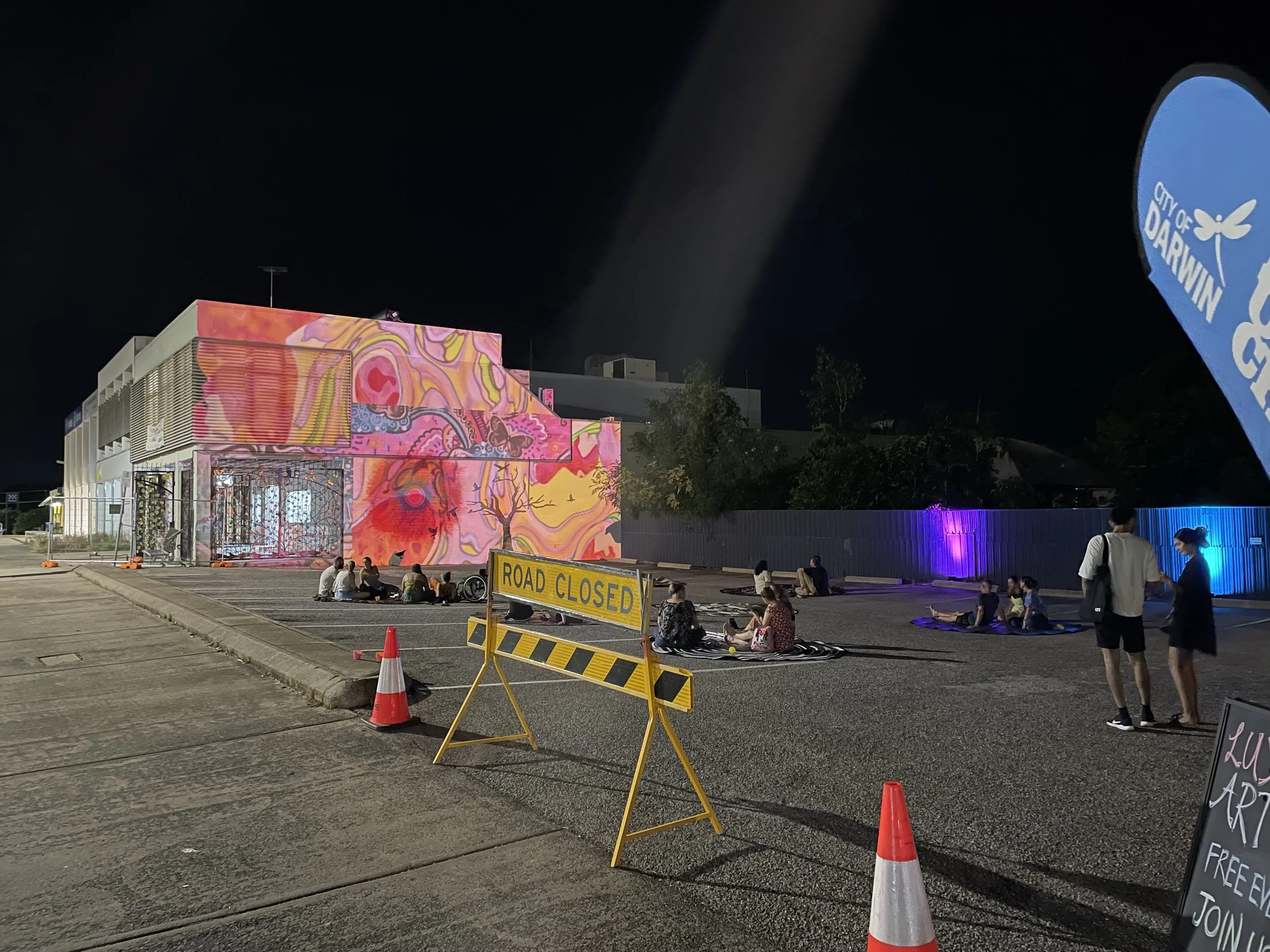Projecting discomfort
LUX Projection event on Bradshaw Terrace.
“….the stories we share below are manifestations of continual becoming, which may resonate or clash, conflict or co-exist in tension.” (Hernańdez et al., 2021, p.845)
The LUX Projection project was commissioned by the City of Darwin. ACCOMPLICE’s role was to support a young producer with the technical elements of putting on a projection project in a public space.
The young producer wanted to run workshops, producing content by young people that could then be curated into a program of projections at an outdoor site that would celebrate young people’s creativity in a public space during youth week.
We offered artists to attend the workshop, we met to explore different sites and we worked with council on the paperwork to run an outdoor event and we then supported the technical testing and delivery of the event.
This event was uncomfortable.
There was significant time and funds spent on:
traffic management to close a rarely used carpark.
who was responsible for public liability insurance.
the creative work by the producer, who didn’t run the workshops and instead focused on his own artistic expression.
technical delivery of the work due to the changing artistic aspirations of the producer and his ‘pushing of the boundaries’ in his work including featuring anuses and nipples in his work which council asked to have removed.
There was a lack of time and energy spent on:
connecting with the young people that already hang out in that space, they spent the evening on the other side of the road throwing juice bottles at cars.
connecting with the rough sleepers in the area, who came in for a feed after some negotiation with council staff. After the event feedback was provided that rough sleepers could not be provided with food if future activities were to be undertaken in public places.
connecting with young people creatively so that they could create and produce content for the program.
connecting with the general public so that they could attend the event.
There are obvious missteps perhaps:
the wrong young person for the opportunity - they were an artist, not interested in event producing.
the timeline was too short.
we should never have committed to an element of a project without a deeper connection to the overall project and process.
However for me this project, this moment in this space highlights what happens when we ignore or erase the existing situated knowledges/relations/collaborations at any given site.
The contractually engaged participants on this project, focused their labour on dotting the i’s and crossing the t’s on the mostly non human logistics of the project. Busy work, undertaken to meet the needs of OHS and risk management plans.
But who was safe? Whose risk was managed? And if someone is not safe or at risk - doesn’t that mean the whole project is in fact in turn at risk? Unsafe?
This kind of work is often infuriating as it is also too easily read by funding and institutionalised stakeholders as examples of ‘well that didn’t work - (insert policy problem) wasn’t solved.’
Through their western structural logistics lens - all that could be done, has been so the fact that it hasn’t ‘worked’ allows them to move on to the next activity. Too often back inside where things are safer, and the risks already managed.
Glen Coulthard (2015) term urbs nullius highlights notions of urban space void of Indigenous sovereign presence and land rights.
The LUX projection project did not attend to this, or any other inter/relations present. Situating the project as existing within a vacuum to be imposed upon the urban space rather than in collaboration/conversation with the human and beyond ecology.
Hernández, K., Rubis, J.M., Theriault, N., Todd, Z., Mitchell, A., Country, B., Burarrwanga, L., Ganambarr, R., Ganambarr-Stubbs, M., Ganambarr, B., Maymuru, D., Suchet-Pearson, S., Lloyd, K., Wright, S., 2021. The Creatures Collective: Manifestings. Environment and Planning E: Nature and Space 4, 838–863. https://doi.org/10.1177/2514848620938316
Coulthard, Glen. (2015). Urbs Nullius: Gentrification and Decolonization. http://ecosocialistsvancouver.org/glen-coulthard-%E2%80%93-urbs-nullius-gentrification-and-decolonization
